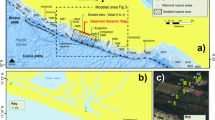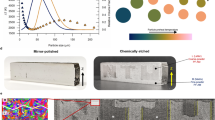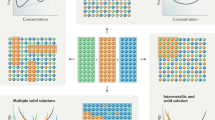Abstract
MANY solid-state reactions involving oxide systems take place by re-organization of cations within a framework of oxygen ions and the rate of the reaction is controlled by ion diffusion rather than by nucleation and grain growth processes. This general concept has been well illustrated by recent work of Bernal et al. 1 on oriented transformations of iron oxides and hydroxides, and of Steadman and Youell2 on the thermal transformation of an iron silicate of layer-lattice type.
This is a preview of subscription content, access via your institution
Access options
Subscribe to this journal
Receive 51 print issues and online access
$199.00 per year
only $3.90 per issue
Buy this article
- Purchase on Springer Link
- Instant access to full article PDF
Prices may be subject to local taxes which are calculated during checkout
Similar content being viewed by others
References
Bernal, J. D., Dasgupta, D. R., and Mackay, A. L., Nature, 180, 645 (1957).
Steadman, R., and Youell, R. F., Nature, 180, 1066 (1957).
Brindley, G. W., and Nakahira, M., Pittsburgh Diffraction Conference, Abstract No. 43 (1957).
Comer, J. J., Koenig, J. H., and Lyons, S. C., Ceramic Industry, Oct. and Dec. (1956).
Author information
Authors and Affiliations
Rights and permissions
About this article
Cite this article
BRINDLEY, G., NAKAHIRA, M. A New Concept of the Transformation Sequence of Kaolinite to Mullite. Nature 181, 1333–1334 (1958). https://doi.org/10.1038/1811333a0
Issue Date:
DOI: https://doi.org/10.1038/1811333a0
This article is cited by
-
Investigation on activation technology of self-heating decarbonization of coal gangue by a sintering process
Journal of Central South University (2023)
-
Effects of temperature on physical and mechanical properties of highly expansive mudstone
Arabian Journal of Geosciences (2022)
-
Flash calcines of kaolinite: Effect of process variables on physical characteristics
Journal of Materials Science (1992)
-
Mineralbestand und Entstehung des ?Porzellanjaspis? von Epterode (Nordhessen)
Beitr�ge zur Mineralogie und Petrographie (1964)
-
Eine neue Deutung der exothermen Reaktion des Kaolinits zwischen 950 bis 1000� C
Die Naturwissenschaften (1959)
Comments
By submitting a comment you agree to abide by our Terms and Community Guidelines. If you find something abusive or that does not comply with our terms or guidelines please flag it as inappropriate.



